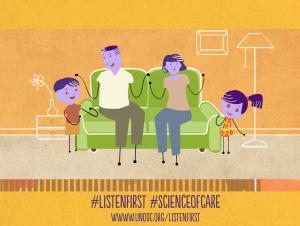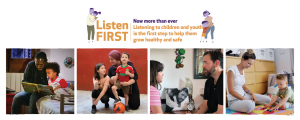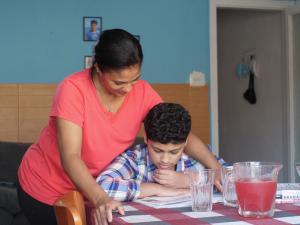UNODC's 'Listen First', supports parents with science-based yet fun and engaging information during the COVID pandemic and beyond.
Research confirms a link between parenting style and children's behavior, educational results, and mental and physical health.”
— Ms. Giovanna Campello, Chief UNODC Prevention, Treatment & Rehabilitation
VIENNA, AUSTRIA, May 31, 2022 /EINPresswire.com/ -- On June 1st, the United Nations celebrates Global Day of Parents, raising awareness of the importance of parenthood, its role in providing protection, and the tools needed for children's positive development.
Research confirms a link between
“Being a parent is complex. You always want to see your children do well, and above all that they are happy. The problems arise when they reach an age where they want to experiment without considering our opinions. ‘Listen First’ is helpful to us. We show our children the videos whenever a complex situation arises,” says Ana Lidia Ndong Bula, mother of Michael (11) & Hector (5)
The Science of Care
According to scientists, parents who are loving, involved, and encourage their children to become independent while setting clear boundaries and rules are the most successful. A lack of parental involvement, structure and limit setting, and inappropriate discipline practices make children more vulnerable to mental health disorders, including substance abuse. An overly protective controlling parenting can also be problematic, as it is associated with aggression, anxiety, depression, and other mental health issues. A punitive parental style where parents strictly enforce rules without warmth and support is also not effective. Not surprisingly, children subjected to violence or neglect also become vulnerable to behavioral problems, including substance abuse.
Parental Involvement
Parental involvement is widely regarded as an essential factor in children's health and well-being, including academic achievement. Children whose parents are positively and supportively engaged in their education (for example, being interested in their homework and participating in school events) have lower drop-out rates and do better in school, regardless of their family's socio-economic background.
Parental involvement is also linked to less alcohol and drug consumption, and less risk of depression and other mental health issues. The positive effects of parental involvement during childhood have long-lasting economic, social, and health benefits that last throughout adulthood.
To learn more visit www.unodc.org/listenfirst




No comments:
Post a Comment